Did Lana Turner Kill Her Boyfriend? This Author Thinks So (Exclusive)
An exclusive excerpt from Casey Sherman's 'A Murder in Hollywood: The Untold Story of Tinseltown’s Most Shocking Crime,' details the aftermath of the infamous 1958 killing
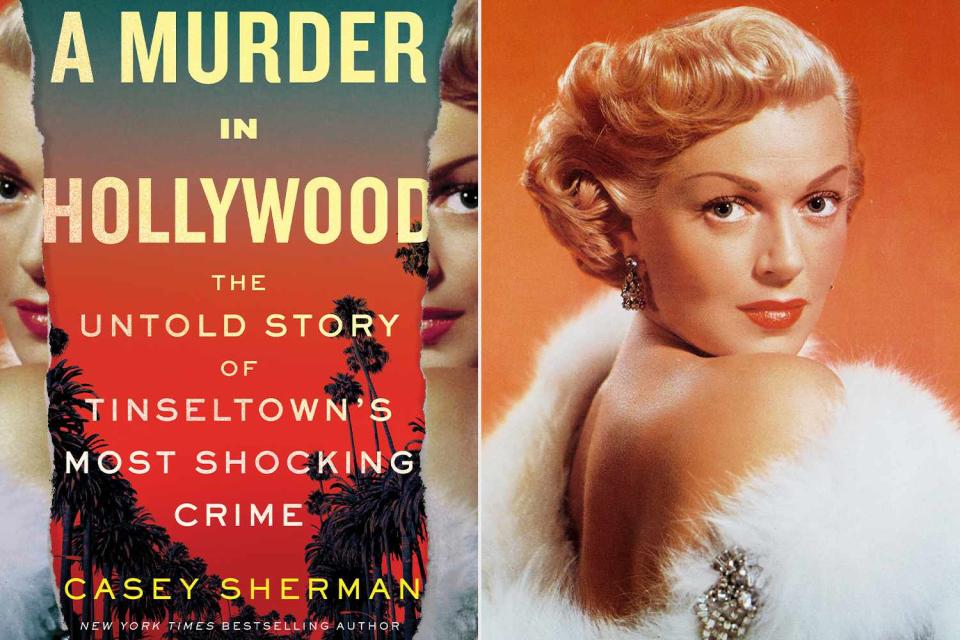
Sourcebooks; Silver Screen Collection/Hulton Archive/Getty
An infamous crime in Hollywood history is getting a new take, this time from journalist Casey Sherman.
In his new book A Murder in Hollywood: The Untold Story of Tinseltown’s Most Shocking Crime, out Feb. 13 from Sourcebooks, the author examines the infamous 1958 murder of gangster Johnny Stompanato by Cheryl Crane, then 14, the daughter of actress Lana Turner and actor and restaurateur Stephen Crane.
“I pored over documents, a lot of FBI files, a lot of the newspaper reporting of the day. And I took a 30,000-foot view of the case,” Sherman tells PEOPLE of the research process. “I realized that Lana and Johnny Stompanato didn't just fall in love, that Lana Turner had been really targeted for an exploitation and extortion plot by not only Johnny Stompanato but Johnny Stompanato's boss, the crime lord, Mickey Cohen, who's really pulling the strings here.”
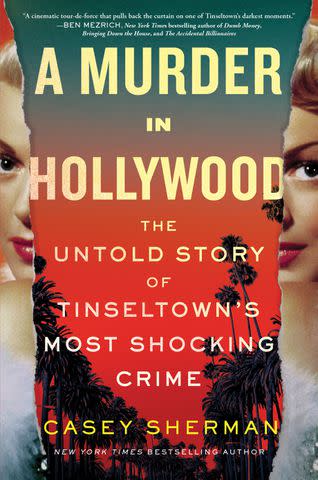
Sourcebooks
'A Murder in Hollywood' by Casey ShermanTurner, known for her roles in films like 1957's Peyton Place, for which she received an Academy Award nomination for Best Actress in a Leading Role, and 1959’s Imitation of Life, had a hold on Hollywood throughout the 50s and 60s, both for her acting and her high-profile love life. Pairings included relationships with Frank Sinatra, Artie Shaw and (allegedly) Clark Gable.
A Murder in Hollywood follows the rise of the Hollywood starlet's profile, from her discovery at a soda fountain by Hollywood Reporter founder William R. Wilkerson to her catapult into fame as a “sweater girl,” as well as her relationship with Stompanato and how Cohen came into the picture.
Cheryl Crane was often witness to Stompanato’s abuse throughout his relationship with her mother. During one heated argument on April 4, 1958, Stompanato threatened to harm Turner, as well as Crane and Turner’s mother, Mildred Cowan. Fearing for her mother's life, Crane entered the room with an eight-inch knife; Stompanato walked into the blade and was fatally stabbed. A coroner's jury declared the case a justifiable homicide. Subsequently, Crane spent time in and out of psychiatric institutions, and attempted suicide, throughout the aftermath and had a complicated relationship with her mother up until Turner’s death in 1995.
Related: Cheryl Crane, Lana Turner's Daughter, Tells Her Story of a Harrowing Hollywood Childhood
“I think that their relationship ebbed and flowed, like many relationships between parents and their children,” Sherman says. “Although this sensational story was kind of hanging around their necks, so to speak.” Both Turner and Crane later published memoirs which touched upon the incident.
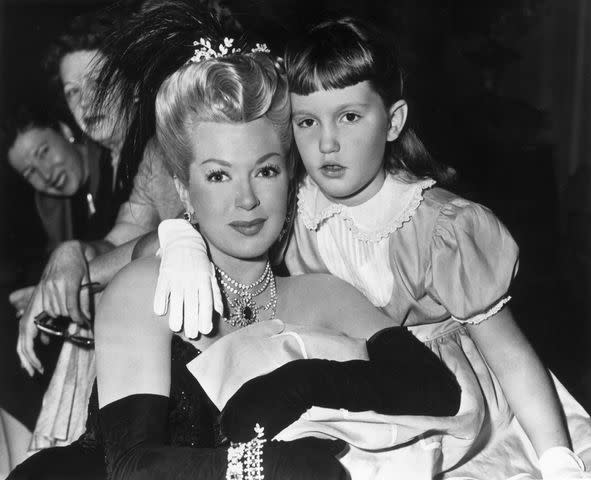
Bob Beerman/Hulton Archive/Getty
Lana Turner (left) with daughter Cheryl Crane in 1952Despite the official verdict, Sherman, who views Turner as a “feminist icon” and early pioneer to the #MeToo movement, has his own perspective on the case.
“I strongly believe Lana Turner killed Johnny Stompanato, but I think she did so in the ultimate attempts to protect her family, her mother and her daughter,” he says. “I think when Johnny Stompanato threatened to kill Cheryl, as you read about in the book, and kill Mildred, Lana was painted into a corner and Lana had to fight back.”
Read an exclusive excerpt from A Murder in Hollywood below.
Never miss a story — sign up for PEOPLE's free daily newsletter to stay up-to-date on the best of what PEOPLE has to offer, from celebrity news to compelling human-interest stories.
The neighborhood was now crawling with police, paparazzi and curious onlookers. Author Dominick Dunne lived around the corner from Lana in a mansion on Walden Drive. He rushed over to the scene with his wife. “I stood outside Lana Turner’s house and watched the comings and goings,” he later wrote. “I wanted to be right in there with Jerry Giesler and Lana, listening to them getting their story straight.”
Giesler’s car pulled up to police headquarters where officers quickly whisked him, Lana and Cheryl into Chief Anderson’s office. The police chief asked Cheryl to explain what happened for the official record.
“Don’t ask her, ask me,” Lana blurted out nervously.
“Lana, please be quiet,” Chief Anderson ordered. “I want to hear it from her.”
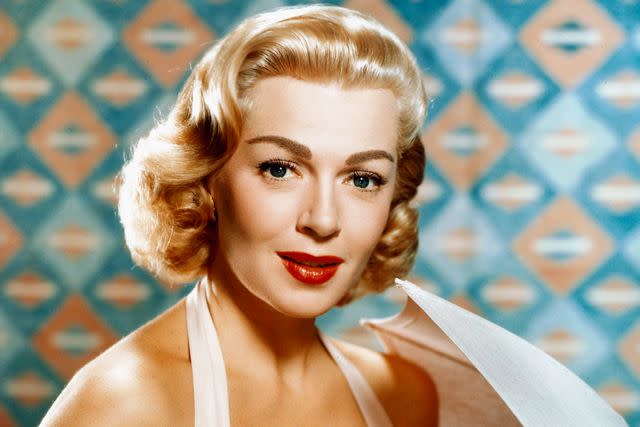
Silver Screen Collection/Getty
Lana TurnerGiesler nodded to Cheryl. The teenager repeated what her attorney had told investigators at the scene. Both Lana and Giesler were impressed with Cheryl’s soliloquy.
“I thought he was going to get her,” the girl told Chief Anderson. “I ran downstairs to the kitchen and grabbed the first big knife I could find and raced back upstairs.” Cheryl went on to say that as Stompanato turned to attack Lana, “I plunged the knife into his stomach with all my might.”
Lana jumped in. “I didn’t know what was happening,” she claimed. “I thought she was poking Johnny with her finger.” She then told the police chief that she had been trying to break off the relationship with Stompanato since Christmas and that she was afraid of him.
Jerry Giesler butted in and declared that the killing was a case of justifiable homicide. The lawyer knew that even if Cheryl was put on trial, the state of California prohibited the death penalty for minors. That would not be the case if Lana herself was charged with the crime.
A police matron was called to Anderson’s office to retrieve the teenager.
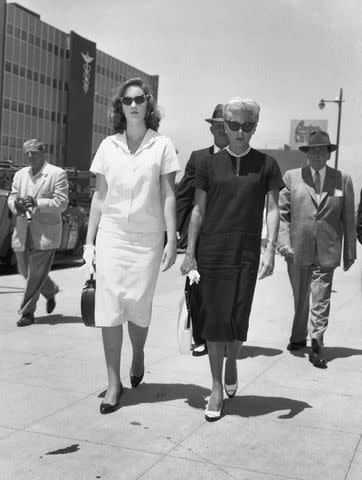
Bettmann/Getty
Cheryl Crane (left) and Lana Turner in 1958“Cheryl, go with her,” Chief Anderson said quietly. “You’ll be spending the night here.”
“No!” Lana screamed. “Let me go with her!”
This was not how it was supposed to go, Lana thought. Giesler had not prepared her for the possibility that Cheryl would go to jail.
The fourteen-year-old was taken out of the office and placed in a cell. Lana was allowed to see her a short time later. Her heart sank when she saw Cheryl behind bars.
“Will you open the door, please?” Lana asked the police matron, who stared back with a blank expression on her face. 10 “Open that door!” Lana screamed.
The female guard obliged, and Lana rushed into the small cell, grabbing hold of Cheryl and squeezing hard. The two collapsed on a jail cot, and Lana wept.
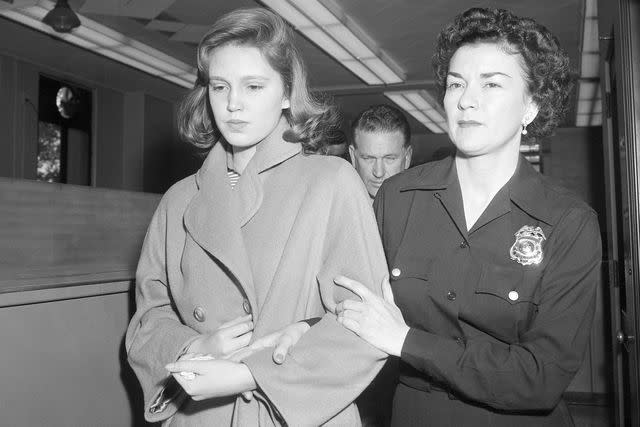
Bettmann Archive/Getty
Cheryl Crane (left) and Lana Turner in 1958“You’ll be all right,” Lana whispered, her guilt over the entire affair punching a hole in her stomach. “You’re the most important one in the world, to all of us. Don’t be afraid.”
She promised her daughter that she would return in the morning to take her home. Lana kissed Cheryl before stepping out of the jail cell with the metal bars closing loudly behind her.
“I wish I were like Mother,” Cheryl told the jail guard. “At least she is able to cry. I can’t.”
“Then you must sleep,” the guard replied.
“I can’t,” Cheryl said in frustration. “I just can’t.”
Excerpted from A Murder in Hollywood: The Untold Story of Tinseltown’s Most Shocking Crime by Casey Sherman. © 2024 by Casey Sherman. Used with permission of the publisher, Sourcebooks, LLC. All rights reserved.
For more People news, make sure to sign up for our newsletter!
Read the original article on People.


